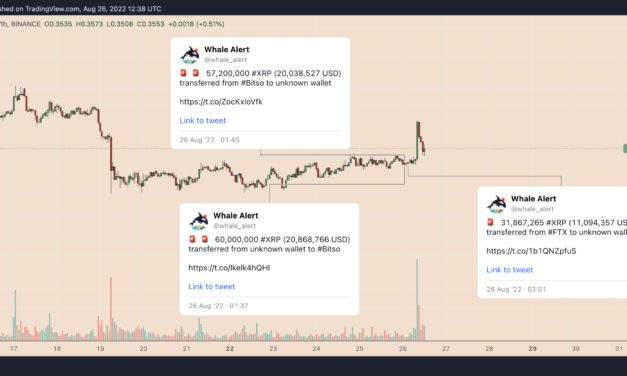XRP price pumps and dumps amid mysterious $51M whale transfers — what's next?
Ripple (XRP) price saw a major spike on Aug. 26, hinting at a possible effect from some big traders.Large XRP transfers, Ripple Swell Global eventNotably, XRP’s price jumped 6% to $0.37, a two-week high, during the early London hours. The token’s upside move occurred hours after its network processed three massive transfers worth $51 million involving crypto exchanges Bitso and FTX, as highlighted by Whale Alert.XRP/USD hourly price chart. Source: TradingViewXRP’s gains also came as a part of a broader upside move that started on Aug. 25, a day after Ripple announced its flagship event, “Ripple Swell Global,” to be held in London in November 2022. The market has seen similar reactions around the Swell event in the past.Bearish reversal setup in playXRP’s intraday spike left behind a “Graveyard Doji,” a bearish reversal candlestick with open, close and low prices near each other with a long upper wick. This candlestick suggests that the price rally witnessed at the beginning of the session was overwhelmed by bears by the end of it.XRP/USD four-hour price chart. Source: TradingViewXRP now trades nearly 4% below its intraday high, testing a support confluence. The confluence comprises the upper trendline of XRP’s previous “ascending triangle” (at $0.35) and the 50-4H exponential moving average (50-4H EMA; the red wave in the chart above) near $0.343.From a technical perspective, a break below the support confluence risks re-triggering the ascending triangle setup, with its profit target at around $0.33. In other words, a 7% price decline by September when measured from today’s price.Related: Ripple CTO lashes back at Vitalik Buterin for his dig at XRPConversely, a rebound after testing the support confluence could have XRP eye a recovery rally toward the $0.36-$0.38 range (marked in red in the chart above). This area served as XRP’s consolidation range in recent months.The views and opinions expressed here are solely those of the author and do not necessarily reflect the views of Cointelegraph.com. Every investment and trading move involves risk, you should conduct your own research when making a decision.
Čítaj viac









